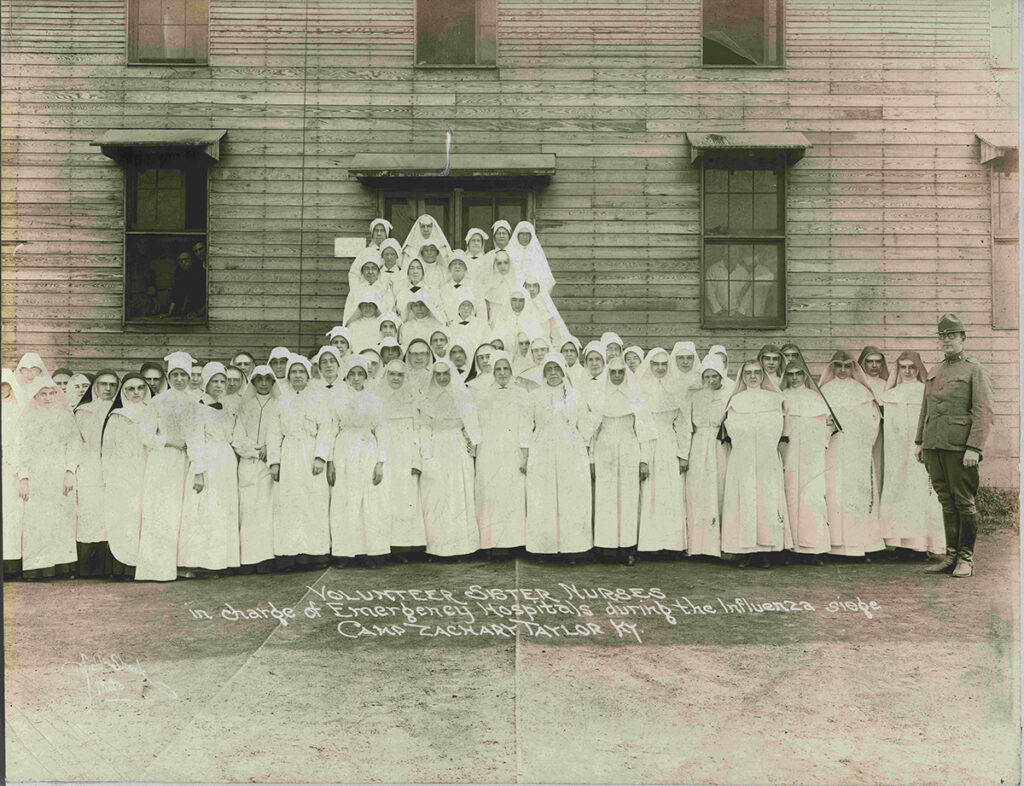Camp Taylor
Ursuline Sisters of Louisville
During the COVID-19 pandemic, a story reemerged of another pandemic more than 100 years earlier during which 15 Ursuline Sisters of Louisville served as nurses for soldiers sick with influenza at Camp Zachary Taylor.
In Fall 1918, an estimated 25-40 percent of the military contracted the flu, and 20 percent of Camp Taylor’s barracks had been converted into emergency hospitals. But there were not enough nurses on staff to care for the overflowing number of patients at the base, and requests for more nurses placed in local newspapers went unanswered. [1]
Father Regis Barrett, a Benedictine priest serving as chaplain for the camp in southern Louisville, had the idea to ask religious sisters to help care for sick soldiers on base. Initially, the base commanders were skeptical that nuns would be a good fit for the task and didn’t think the chaplain could find any sisters regardless. [2] But their concerns proved to be unfounded. Father Barrett recruited 88 sisters from 7 different religious congregations in the region to volunteer as nurses, despite the fact that most of them were trained as teachers and had no experience in nursing. Fifteen of those sisters were from the Ursuline Sisters of Louisville.
For more than a month, from early October through early November 2018, the sisters worked 7 days a week for 12 hours a day, usually with just 1 or 2 sisters assigned to a barrack full of 125-150 men. [3] Their duties included assessing each patient’s temperature, pulse and respiration twice a day. The sisters also dispensed medication and generally provided for the men’s comfort, often writing letters to their loved ones.
Ursuline Sister Boniface Lenz wrote an account of her experience at Camp Taylor that is preserved in our archives. Here’s how she described conditions in the barracks:
Patients were brought in from the drill grounds where they were dropping like flies, and laid down on the floor until we found either a bed or a few wooden boxes on which to put a quilt for a mattress. These men were the most pitiful looking human beings I really ever expect to see in my whole life.
At least 22 of the 88 sisters at Camp Taylor became ill with the flu themselves, including Louisville Ursuline Sisters Marcelline Bloom and Cosma Coponi. Sister Cosma’s condition became so poor that she was sent home to die, but her mother apparently insisted that “My Patrina is not going to die.” (Patrina was Sr. Cosma’s baptismal name.) Indeed, she did not die, but went on to become Mother Superior and lived to be 90 years old.
All the sisters left the camp by November 11, as school resumed the next day. Sister Boniface summed up her experience:
There were heartbreaking times, times when all of us felt that we would never come out of it all alive. But the same dear God who brought us there, took us there, took us home. A home we appreciated more than ever before, with companions who were our own.
[1] Thompson, Mary Ann, and Sara Bolten. “‘They Buckled on the Armor of God’: Kentucky Catholic Sister “Nurses” in the 1918 Flu Pandemic.” American Catholic Studies, vol. 129, no. 4, Winter 2018, pp. 91-105.
[2] Ibid.
[3] Ibid.
Names of the 15 Ursuline Sisters of Louisville who served at Camp Taylor in Fall 1918:
Sisters Marcelline Bloom, Ignatia Brinker, Louise Budden, Charles Convery, Cosma Coponi, Gertrude Fromhold, Charlotte Heitz, Johanna Hollenkamp, Generose Holtman, Gregory Klemenz, Boniface Lenz, Mary Louis Morgan, Camilla Sommer, Sienna Spaeth, and Joseph Winters.
Photo: Group shot of many of the sisters who volunteered as nurses at Camp Taylor during the influenza pandemic in Fall 1918

